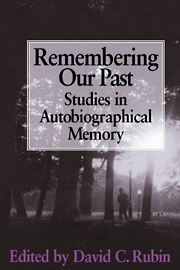Book contents
- Frontmatter
- Contents
- List of contributors
- 1 Introduction
- Part I Approaches
- Part II Accuracy
- 5 Time in autobiographical memory
- 6 The pliability of autobiographical memory: Misinformation and the false memory problem
- 7 Autobiographical memory in court
- Part III Emotions
- Part IV Social functions
- Part V Development and disruption
- Subject index
- Author index
5 - Time in autobiographical memory
Published online by Cambridge University Press: 14 October 2009
- Frontmatter
- Contents
- List of contributors
- 1 Introduction
- Part I Approaches
- Part II Accuracy
- 5 Time in autobiographical memory
- 6 The pliability of autobiographical memory: Misinformation and the false memory problem
- 7 Autobiographical memory in court
- Part III Emotions
- Part IV Social functions
- Part V Development and disruption
- Subject index
- Author index
Summary
Introduction
Nothing appears more fundamental to a biography than time. Life is a succession of events that are intricately related, causally and intentionally. But however complicated the relations may be, the events occur in a chronological sequence. Many events are repeated with minor variations from day to day, from week to week, and from year to year, and therefore merge to become general knowledge. No matter how small the variations may be, however, any two events in a person's life can in principle be distinguished by the unique times when they occurred. Accordingly, in the art of biography that flourished in the eighteenth century, the description of the life of the subject was fastidiously chronological, as seen in Boswell's famous “Life of Johnson” (1791/1980).
Autobiographical memory (i.e., memories of events experienced by the individual) is likewise unthinkable without reference to time. Though we do not recall the time of events precisely, the memories appear to our present consciousness as representing – more or less completely – a chronologically ordered, continuous past reality. Indeed, a person whose past was lacking temporal organization could not have the awareness of a history, of a course of development that is a defining part of the experience of a self; she/he would be not only a disorderly person, but a severely disordered personality (cf. Melges, 1982).
- Type
- Chapter
- Information
- Remembering our PastStudies in Autobiographical Memory, pp. 129 - 156Publisher: Cambridge University PressPrint publication year: 1996
- 20
- Cited by

